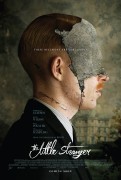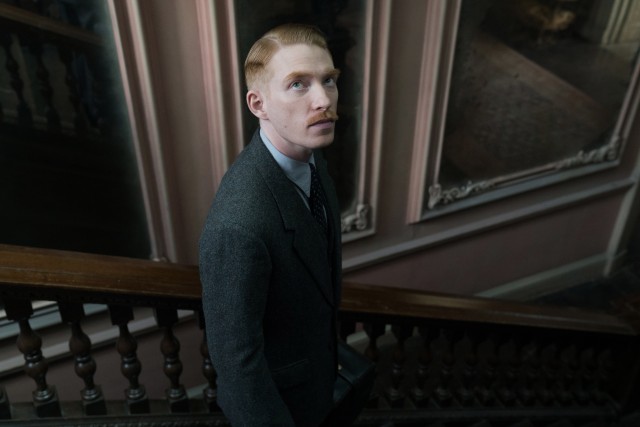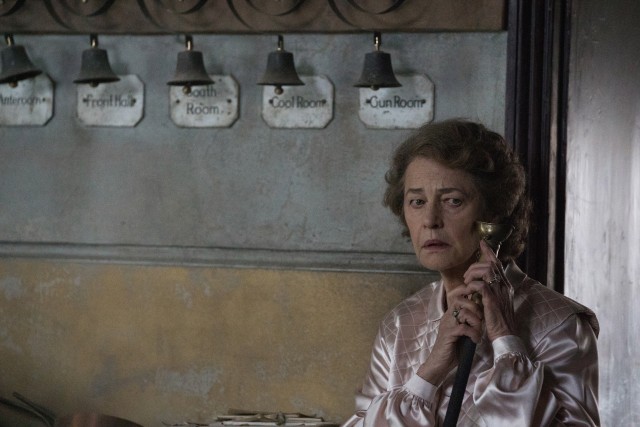The Little Stranger Movie Review
 |
The Little Stranger
Theatrical Release: August 31, 2018 / Running Time: 111 Minutes / Rating: R Director: Lenny Abrahamson / Writers: Sarah Waters (novel); Lucinda Coxon (screenplay) Cast: Domhnall Gleeson (Dr. Faraday), Ruth Wilson (Caroline Ayres), Will Poulter (Roderick Ayres), Charlotte Rampling (Mrs. Angela Ayres), Anna Madeley (Anne Granger), Josh Dylan (Bland), Liv Hill (House Maid), Oliver Zetterstr๖m (Young Faraday), Tipper Seifert-Cleveland (Young Susan) |
Though it sold fewer than two million tickets in North America, the 2015 drama Room had the kind of golden reception most filmmakers can only dream of. Little Stranger's screenplay hails from England's Lucinda Coxon (The Danish Girl), who adapts the 2009 novel of the same name by Welsh author Sarah Waters.
The film is set primarily at Hundreds Hall, a mansion in the English countryside, in what is not very clearly 1947. We enter the declining estate with Dr. Faraday (Domhnall Gleeson), a clean-cut, mustachioed physician initially called to attend to the teenaged house maid. Faraday ends up staying on to try some experimental treatments on Roderick Ayres (Will Poulter), a PTSD-stricken War veteran with a disfigured face and a severe limp. The doctor intends to present his findings on how the master of the house responds to electricity applied to his wounds.
But there's more than that going on. Roderick is struggling to keep the estate afloat, contemplating selling some land. His sister Caroline (Ruth Wilson) is also of note to Dr. Faraday, as a potential love interest. There are some disturbances at the house which invite speculation of something fantastical afoot as well.
The setting immediately evokes such classic gothic films as Rebecca and Wuthering Heights. There is something inherently alluring and cinematic about a big old house and the enveloping atmosphere of The Little Stranger goes a long way towards distracting from the narrative woes.
Eventually, though, the muddled storytelling proves to be somewhat fatal. Coxon's screenplay finds a principal character inexplicably disappearing for an extended stretch and a story that is impossible to follow, Gleeson is good in the lead role, as are Wilson (indistinguishable, as usual, from Michelle Monaghan) and Poulter in the flashier roles. Charlotte Rampling chips in some befitting older generation snark. But you keep waiting for the movie to be as good as it looks and sounds. And after an eternity that is somehow less than two hours, it never quite does.
|
Related Reviews:
DVDizzy.com | DVD and Blu-ray Reviews | New and Upcoming DVD & Blu-ray Schedule | Upcoming Cover Art | Search This Site
DVDizzy.com Top Stories:
Directed by Lenny Abrahamson: Room
Domhnall Gleeson: Ex Machina Goodbye Christopher Robin Brooklyn The Revenant Shadow Dancer American Made
Ruth Wilson: Saving Mr. Banks The Lone Ranger | Will Poulter: Detroit Son of Rambow
Charlotte Rampling: 45 Years The Sense of an Ending Red Sparrow
Rebecca Crimson Peak Stonehearst Asylum
Now in Theaters: Searching Christopher Robin Operation Finale BlacKkKlansman Kin
Text copyright 2018 DVDizzy.com. Images copyright 2018 Focus Features, Path้, Film4, Ingenious Media, and The Irish Film Board.
Unauthorized reproduction prohibited.

